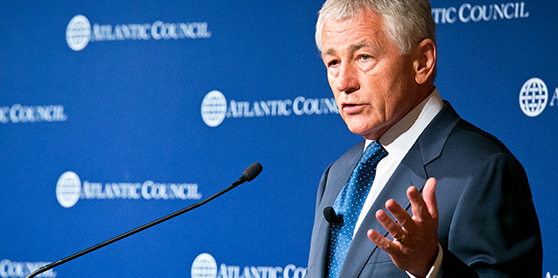
Some people are seeking to block Chuck Hagel’s confirmation as defense secretary on the basis that he is out of the mainstream on national security policy and intolerant of gays. These charges don’t stand up to either his public record or his personal relationships.
As executive vice president of the Atlantic Council, where Hagel is chairman, I have had the privilege to work with the former senator since 2009. In addition to being a centrist policy wonk, I am gay.
Much has been made of Hagel’s comments 15 years ago regarding the appointment of James Hormel, a gay man, as ambassador to Luxembourg. Hormel, whom I knew and admired when I was a young State Department employee, has accepted Hagel’s apology. Furthermore, Hagel has underscored that he is “fully supportive of ‘open service’ and committed to LGBT [lesbian, gay, bisexual and transgender] military families.”
I know from experience that Hagel’s views on this subject are real. As the leader of the organization at which I work, he has demonstrated acceptance and support for all employees, including LGBT employees. I joined the council as director of the international security program, and his backing was crucial in later helping me transition to second-in-command to our president and chief executive, Fred Kempe. Hagel has supported me professionally as well as personally, including being very welcoming to my former partner, who regularly joined me at events.
I was uncomfortable with some of the positions Hagel took over the years on social issues. But by his own words, so is he. He has made clear that his positions have evolved. As more gay men and lesbians serve our country openly in the national security, foreign policy and political worlds, sexual orientation is becoming a non-issue. As President Obama has shown, people’s positions evolve, influenced by their experiences and relationships. This kind of change is a strength in our nation. And Hagel’s ability to make those changes is a tribute to his judgment and humanity.
Of course being gay had nothing to do with why I came to work at the Atlantic Council. I decided that I could continue to serve our nation at the council, outside of government, because of its leadership. Under Hagel and Kempe, the council has created an environment in which its nonpartisan status is not lip service. Rather, the Atlantic Council embraces the concept that, for U.S. foreign policy to be effective and sustainable, it needs to enjoy bipartisan support.
That’s why Hagel presides over a board made up of Democrats and Republicans. That’s why our staff represents views from both parties. It’s why any council task force includes prominent individuals from both sides of the aisle. For example, Republican Sen. Lindsey Graham, who has criticized Hagel, served as a co-chair (along with Democratic Sen. Jeanne Shaheen) of a council task force on the republic of Georgia. It’s not that these folks don’t have partisan views. But they know that, when they sit around a table at the Atlantic Council, their task is to reach common, practical solutions to tough problems facing the United States and its allies.
For someone like me, who worked in the Clinton and George W. Bush administrations, including for Susan Rice and Condoleezza Rice, the council is a comfortable home. Hagel has nurtured this type of bipartisan cooperation, exemplifying the kind of approach and leadership Washington desperately needs.
Yes, Chuck Hagel has strong views. Presumably, this is why Obama picked him. It’s a source of his leadership that he has convictions. But Hagel is also open to other views. He has welcomed at the council voices of influence such as John McCain, with whom he differed in the Senate over such issues as the war in Iraq and whom the council honored with its 2011 Freedom Award.
At the same time, Hagel has helped unify a bipartisan group of leaders around a critical mission: promoting constructive U.S. leadership and engagement in the world based on the central role of the Atlantic community in meeting the global challenges of the 21st century.
I support Hagel’s nomination, knowing that he will take to the Pentagon the ethos he instilled at the Atlantic Council: relevance, pragmatism, centrism, decisiveness and commitment to leading alliances and building partnerships to solve today’s most pressing problems. I also welcome him having a chance to demonstrate inside the Defense Department his support for talent without regard to sexual orientation and to build on President Obama’s impressive record supporting LGBT servicemembers and their families.
Damon Wilson is executive vice president at the Atlantic Council. This piece first appeared on The Washington Post.